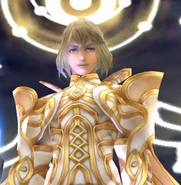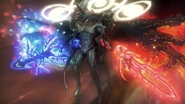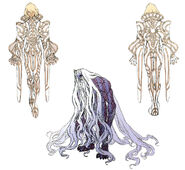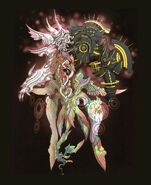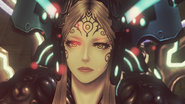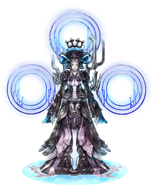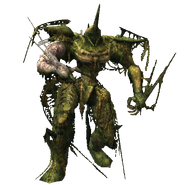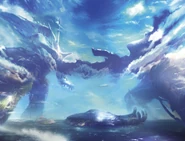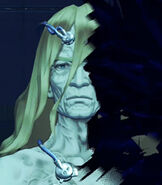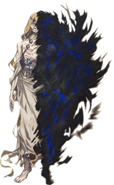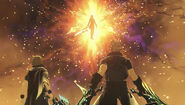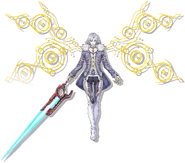
|
For those who have not completed games in the Xenoblade Chronicles series, this page contains spoilers regarding the plot. Discretion is advised. |
Gods, Deities or Divinities are particular beings in the Xenoblade Chronicles series.
Overview
Gods are characters proclaimed as such by the peoples they created in Xenoblade Chronicles and Xenoblade Chronicles 2, or self-proclaimed like Zanza himself once reincarnated and returned, or like Alpha in Future Redeemed. These characters have partially or fully contributed to create the world where they live or are willing to annihilate and recreate a new world. Despite their name, they are (or were) actually physical and capable of being destroyed by a more powerful foe.
Contrary to the Xenoblade Chronicles trilogy, in Xenoblade Chronicles X gods, deities or divinities are more generically and variably mentioned depending on the culture of each human people or each xenoform race.
Xenoblade Chronicles trilogy
In Xenoblade Chronicles, each god, Lord Zanza and Lady Meyneth, is represented by a titan, Bionis and Mechonis, and a Monado in the game's story. As long as the peoples do not know the real nature of Bionis and Mechonis, they considered them as Gods. Bionis is the organic "Giant God" and the cradle of the Homs, Nopon, High Entia peoples amongst other forms of organic life, and was also home of the Giants in the past. Mechonis is the mechanical "Giant God" and the cradle of the Mechon and the Machina people.
In Xenoblade Chronicles 2, the different human-like peoples of the world of Alrest proclaim the Architect as the "God of Creation".
Trilogy plot
It is revealed in Xenoblade Chronicles that Zanza and Meyneth are the reincarnation of two humans, Klaus and his colleague later known as Galea. Klaus was once a scientist working on a project attempting to create a new universe, hoping to help mankind reach divinity. His experiment succeeded in creating a new universe, and most of all life was sucked into this new universe, including half of Klaus's body, which came to be known as Zanza, and Klaus's coworker who would become Meyneth. These two were the only beings to survive the destruction, and emerged from the endless sea of this new universe as Bionis and Mechonis, respectively.
Once Shulk defeat Zanza, Alvis speaks to Zanza, informing him that even gods are restricted by providence. Zanza sees this as a betrayal, and rebukes Alvis for disobeying him. Alvis is unfazed by this, and asks Shulk to make a decision: "Does this world belong to Zanza? Or does it belong to you?" The Monado III then gains a new symbol (神, kanji for god/deity), giving it the power to kill gods. Shulk rends Zanza in half, and the god is destroyed. Alvis, the physical manifestation of the Monado, asks Shulk what he desires to do with his newfound power. At this moment, Shulk momentarily somewhat play a sort of role of a god. Shulk ultimately wishes for a world with no need for gods, honoring Meyneth's final wish. He tosses his Monado aside, ending the need for gods and Bionis itself. The world is recreated, and transformed into a state similar to how it was originally, with continents instead of titans. It is unclear how similar this universe is supposed to be to the original, but Alvis' parting words indicate an optimistic future.
In Xenoblade Chronicles 2, it is revealed that half of Klaus was reincarnated in Zanza in the first game universe while the Architect is the reincarnation of the other half of Klaus in the second game universe. The Architect reveals that after the disaster produced by the activation of the Conduit, Klaus, filled with guilt over his actions, took over himself to fix the world of Alrest. In order to do so, he first created the Cloud Sea, formed of special particulate substances that could restore matter. After that, Klaus used Core Crystals, which contained biological information, to recreate life. When being in contact with the Cloud Sea, Core Crystals became Titans, which grew in size over time and slowly produced more life, while at the same time serving as their home. Despite this, Klaus did not trust this new cycle of life, and took advantage of the Core Crystals to create the Blades, which would serve to supervise the development of the new humans, in hope that they would not repeat the errors of the past.
When Rex and Pyra arrive at the First Low Orbit Station, Klaus tests them to see exactly how far humanity had come. After explaining to them the truth about their world and about himself, he tells them about the imminent death of Zanza (his other half), warning them that the Conduit would then disappear to another dimension, and advises the party to defeat Malos before that happened. As Zanza is killed by Shulk, Klaus begins disappearing. During the final moments of his life, he removes the Cloud Sea, and commands the Titans to form a new land, that being his final gift to the lives he had created as he fades away.
In Future Redeemed, Alpha who is a reincarnation of Ontos, one of the cores of the Trinity Processor, and the antagonist of the game, self-proclaims to be a new or sort of god in Aionios. Once proclaimed himself as "Alpha", he deemed the lives of the Kevesi and Agnian people unnecessary for the future, and sought to create a new future in which no traces of the old worlds would remain. Rex, Shulk, and Z attempted to stop him, but they were effortlessly defeated in a single strike from the Monado. Around a decade later, Alpha's core was found on Corne Island by Na'el. To create his new future, Alpha planned to bring the City's people to a new world while annihilating Aionios in the process, using Na'el to do so. However, N's destruction of the City prevented him from carrying it out to its conclusion. Due to the powers wielded by N and Ghondor during that event, a fragment of his being composed of his memories and discarded "conscience" was unexpectedly freed and attained self-awareness, becoming A. Alpha would later possess Na'el, using her body as a vessel in the same way that Zanza once did with Shulk and seized control of Origin to turn it into his "Ark". Alpha, through Na'el, begins rounding up the scattered Citizens across the Cent-Omnia Region. During the final fight against him, Alpha unleashes his true form, that of a large humanoid figure with an empty, mask-like face. In a final effort to defeat Alpha, N grants Matthew the powers of his sword and instructs him to combine it with his Ouroboros Knuckles. Matthew's gauntlets begin to emit green energy, and a manifestation of Pneuma's core appears on his gauntlet, which grants the party the true power of Ouroboros, resulting in Alpha's demise. It was later revealed that the Origin metal contained in Matthew's blade are contained both Mythra's and Pyra's souls and wills. Similarly, Malos was revealed to be within N's sword. As Alpha starts to disintegrate he tells Matthew that his actions have made the future uncertain then asks him if he has any regrets. Matthew on the other hand says that they will move forward then tells Alpha his farewells.
In the reunited world of Aionios in Xenoblade Chronicles 3, humans are considered as a whole human single race and no gods are proclaimed.
Gnosticism
A main thematic in the Xenoblade Chronicles trilogy refers to the Gnosticism, particularly incarnated by the Monado which name likely derived from Gnosticism in which the Monad is the Supreme Being, the highest god that created lesser gods or divine entities. Gnostic references have been a recurring theme throughout Tetsuya Takahashi's works, including Xenogears and Xenosaga. The Gnostic concept in turn was inspired by Greek philosophy. Pythagoreans called the first thing that came into existence "monad", which begat the dyad, which begat numbers, points, lines, etc. It meant the first being or the totality of all beings.
List of Gods
Xenoblade Chronicles X
The Zaruboggan people worship their Samaarian creators as the mythical benevolent deity Golbogga that created all their voltant. The Samaarians are a mysterious race who are humanity's ancestors and the original founders of the Samaar Federation. They engineered other races, including the Ganglion and the Zaruboggan. This was not an altruistic act of creation, these races were made to serve Samaarians, and were built with failsafes to ensure that servitude. This explains why the Samaarians have a kind of divine consideration, particularly from the Zaruboggan.
Fortun who is the Queen and Mother of the Definians, and the wielder of ancient galactic knowledge, implicitly considers herself as a superior being.
The Ovah is a virus that exists within the Orpheans. It guides them in an attempt to secure its survival. It is probable that this is what allowed them to survive and thrive on their home planet. The Orpheans describe the Ovah's effects as a kind of gut feeling inside them. They view it as something sacred, unique to them, however during their stay on Mira, the virus was able to bond with the Visigels of Cauldros, calling their beliefs into question. In the distant past, before they began to inhabit the Orpheans, the Ovah were once a single entity. It floated in the ocean of another world where Telethia also lived. The Telethia of Mira apparently considers the Ovah impure, and it is hostile to Orpheans. The names of the Orphean or Orphe race may have been derived from Orpheus (French: Orphée), a famous musician, poet, augur and seer in ancient Greek mythology. Augurs attempted to divine the will of the gods from signs and omens, a role which is reflected in the Orpheans' emphasis on following the "will of the Ovah."
The Telethia, Telethia, the Endbringer or Telethia Plume, dwell in a place called the Divine Roost. The Telethia of Mira is defined as the "Guardian of the Planet" and is said to be the culler of unclean lifeforms, also known as the 'Ruler of Fates.'
Four Nopon are considered as sacred spirits, Nopopon, Napopon, Nipopon and Nupopon. They are encountered by the party during the series of Normal Missions known as The Divine Nopopon, The Divine Napopon, The Divine Nipopon and the The Divine Nupopon.
God (monotheism) or Gods (polytheism) can be mentioned by several human characters of New Los Angeles because of their cultures or religions in direct reference to the real cultures and religions amongst the peoples of Earth.
